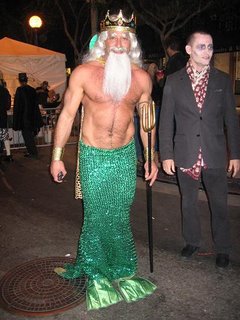In the wake of the revocation of Fernandes' promotion by the Board of Trustees, the Deaf Blogosphere (or DeafBlogLand, if you will) celebrated and conducted an online assessment of the conclusion of the protest. Not to be outdone, the Corporate Media weighed in with its own postmortem-- but it wasn't very pretty.
While our internal community's retrospective was congratulatory and focused on the work that remained to be done, the outside world seemed to be tut-tutting at the turn of affairs at 800 Florida Avenue NE. Whether that bodes well or not, I'm not sure, but it does mean that in addition to the on-campus issues (audism, racism, sexism, institutionalism, dwarfism, Papism, ad nauseam), the campus community and the deaf community at large will have to fight an even larger (and to my mind, far more important) battle: the public relations image of Gallaudet, and by extension, the deaf community.
For better or worse, Gallaudet represents the deaf community (or at least, a very visible portion of it!); this can be positive, as it was in the wake of DPN, or when an alumni succeeded and attributed their accomplishments to their studies at Gallaudet. But it can also be a distinct drawback; if I had a dollar for every person I've talked with who said that they encountered skepticism in job interviews or outside contacts regarding their Gallaudet degrees, I could take a nice weekend trip somewhere (Jamie Berke, over at
Berke Outspoken, talked about enrollment, and the
subject of public perception emerged in the conversation she quoted). Like it or not, what happens at Gallaudet does impact (fairly or not!) public perception of Gallaudet alumni everywhere, and by extension, the signing deaf community at large.
A recent incident in my life exemplifies this: the Thursday before the Board capitulated to student demands, I had an obligation at my temp job that required an interpreter. The interpreter was new to me, and I to her-- as we chatted a bit and got to know each other, the inevitable question came up: "What do you think of Gallaudet?" I shared my stance, but quickly learned that the interpreter was against the protest. Now, bear in mind, this is someone who has had a long association with the community, views deaf people as equal to hearing people, understood Deaf Culture, signs ASL, and as a minority, understood how minority deaf people feel and where they're coming from. Yet she couldn't support the protest-- and this was largely because her perception was that the protest was based on identity politics.
For many of us who were not on campus or were not in touch with people who were on campus, it's very easy to view Gallaudet through the prism of the media, of second- and third-hand narratives, of information that that isn't and wasn't clearly explained and dissected. I spend way too much of my time tethered to my pager and to the computer, and in touch with people who are in contact with far more connected people than I. But this interpreter wasn't, and to be honest, she was far from alone. I've talked with tons of people out here over the last few months, and very few demonstrated they really understood and were able to sort through the various layers of issues, concerns, and elements regarding Fernandes, Gallaudet, the protest, and the state of the community the last 6-8 months.
I then explained to her why I supported the protest (with reservations, of course!); as I guided her through the timeline and explained each step of the way what various individuals and groups said and did, she started to understand. By the end of our conversation, she supported the protest, but agreed with me that FSSA had done a piss-poor job of PR, and that identity politics clouded everything.
Yes, identity politics. For that, we have quite a few people to thank. First are those idiots that verbalized and advertised their opposition to Fernandes based solely on her not being "deaf enough" or her (in)ability to sign ASL, her aloofness, her seeming disconnection to the pulse of the community, etc. Jeers also to Fernandes, Mercy Coogan, and the administration in general, who seized upon identity politics as the overarching narrative, and continued to push it in the media, at every opportunity. Personally, I'd like to see Coogan follow Fernandes and Jordan out the door; I really don't understand why Gallaudet couldn't have hired a deaf person to handle public relations-- it's not like they haven't before.
Finally, raspberries to the sorry individuals who collectively make up the Corporate Media-- while Susan Kinzie eventually wrote some balanced articles in her coverage of the protest for the
Washington Post, quite a few others out there didn't do their homework, and merely seized upon what they considered to be conventional wisdom.
Some writers excoriated nearly everyone, and it doesn't come across as good: witness Marc Fisher's WaPo blog of October 30 [
"Gallaudet's Grievous Misstep"], in which he takes the BoT to task, commenting "that they caved to the petulence and arrogance of the student protestors while sending only the mildest message of rebuke." His words paint the BoT as a bunch of ninnies, and the students as petulant and arrogant. Not a pretty picture. He also mentions Congress (which I think is NOT good-- remember, Congress is theoretically ultimately responsible to the voters and the citizens at large-- and if they think Gallaudet is a waste of money, they *will* tell their representatives so): "...the federal government, which uses taxpayer dollars to provide 70 percent of Gallaudet's budget... It will take a long time before Gallaudet's administration can regain any sense of control over the school; maybe they need some help from the entity that pays the freight."
The comments aren't much better either. Witness the words of Not my Tax Dollars:
If 70% of Gallaudet's money comes from the government and many students never really graduate (they jut linger around for years), where is the oversight as to how taxpayers money is being spent? Is Gallaudet a "true" university and is a degree from Gallaudet equivalent to a degree from any other university? If it is an accredited university, it certainly lacks guidelines that is applicable to other universities. It appears to me that my tax dollars is funding a free-wheeling commune. I say, shut it down unless it can be run as a real educational institution.
Let's hope people with the real power over the purse strings never read that...
But Fisher is in the minority-- most reporters and commenters merely repeated the basic facts, but they continued to select and highlight comments about identity politics. For example, in the
New York Times article on October 30 [
At College for Deaf, Trustees Drop New Leader], Diana Jean Schemo writes,
Dr. Chen Pichler said that protesters doubted Dr. Fernandes’s commitment to upholding the primacy of American Sign Language on campus, and that the next person selected would have to be strongly committed to reinforcing what is often referred to as Deaf culture — with a capital D — at Gallaudet.
While Dr. Chen Pichler mentioned that there were a host of other issues involved, the major quote was about-- surprise-- identity politics. It was only at the very end of the article (which is the first place that regional and local newspapers cut when they run out of room to publish the article in full-- I used to work in a newspaper composing room, and you'd be surprised at how much gets left out of the original article, even at the paper where the story originates) that Schemo mentions a crucial fact: "In a faculty vote several weeks ago, 82 percent of the faculty demanded that she step down." [Schemo's
subsequent article, on October 31, was an improvement, but still danced around ASL, identity politics, and other factors that had nothing to do with Fernandes' mismanagement of Pre-College Programs and her actions as Provost, to say nothing of the problems during the Presidential selection process]
Back to the
Post: the paper's editorial of October 31 [
Gallaudet's Loss] again stressed disapproval of the students' actions-- while this is just the
Post, the paper is rather influential in our public discourse, and is read by millions daily. The editorial's authors condemned the students: "...what triumphed was lawlessness and the principle that a university president should be chosen on the basis of popularity." [Obviously, the writers didn't read my posts about the fact that ultimately, the issue was the
promotion of Fernandes, and the facts showed she wasn't deserving of
promotion] The editorial went on to point out the lack of public relations on the part of the students [i.e., FSSA]:
When students launched their protest against president-designate Fernandes in the spring, many of them stated the objection that she was "not deaf enough." Though deaf, she grew up speaking and lip-reading; she did not learn sign language until she was a young adult. That protest theme didn't play well beyond Gallaudet, and it was dropped from public discourse; students and faculty soon were reacting angrily if it was ascribed to them. But the protest movement never came up with a convincing alternative explanation for their anti-Fernandes passion. All that was left was a series of relatively petty complaints about her executive style as provost.
I don't agree with the editorial at all, and I think the editorial's authors didn't fully do their homework (and obviously didn't do a good job of talking to Kinzie or reading her work; the disconnect between the editorial and news departments is common at many, many newspapers), but fairly or not, this is how the Corporate Media views the protests, the students, and Gallaudet as a whole.
Susan Kinzie's article, co-written with David Fahrenthold, on October 31 [At Gallaudet, Peace], discussed the aftermath of the protest, but quoted Dr. Janet Pray: "It's very dismaying to think what the future will be here. The board of trustees has sent a message that if you don't like a decision the board makes, you can just throw a temper tantrum . . ." While Pray was noted to be an administrator and Fernandes supporter, the notion that the students/protesters were throwing "a temper tantrum" isn't the kind of image Gallaudet or the deaf community needs.
So far, a lot of the problems stem from officials, professors, and staff members who have been quoted on Gallaudet. But it doesn't help when Noah Beckman, in an otherwise excellent interview with
Newsweek [
Being Heard] , closes by saying that he cut class [yes, Beckman, among others, was probably exhausted and needed a bit of downtime-- but is that really something you want to share with the world at large? What does that say about the emphasis placed on academics and personal drive?]. The beer chugging during the celebrations didn't help either-- luckily, it doesn't seem like the fallout from that landed in the national media [with the exception of
Washington Post Express], but it certainly made an impression in the deaf blogosphere, as evidenced in DeafDC's
coverage of the incident making the
Express.
I could go on and on, but I think you get the point. Luckily, there are some of us that are battling back in public. Aside from his unfortunate final comment, Beckman gave a good interview to
Newsweek, and Kelby Brick's
Op-Ed piece in the
Baltimore Sun was sorely needed. It's going to take far more than just a bunch of interviews or some columns, or even blogs like the one I'm writing now. As my conversation with the interpreter demonstrates, we're going to have reclaim our public image, both as deaf people and as alumni, bit by bit, piece by piece, person by person. We're going to have to work harder at being ambassadors on behalf of deafness and deaf people than we ever have before.









